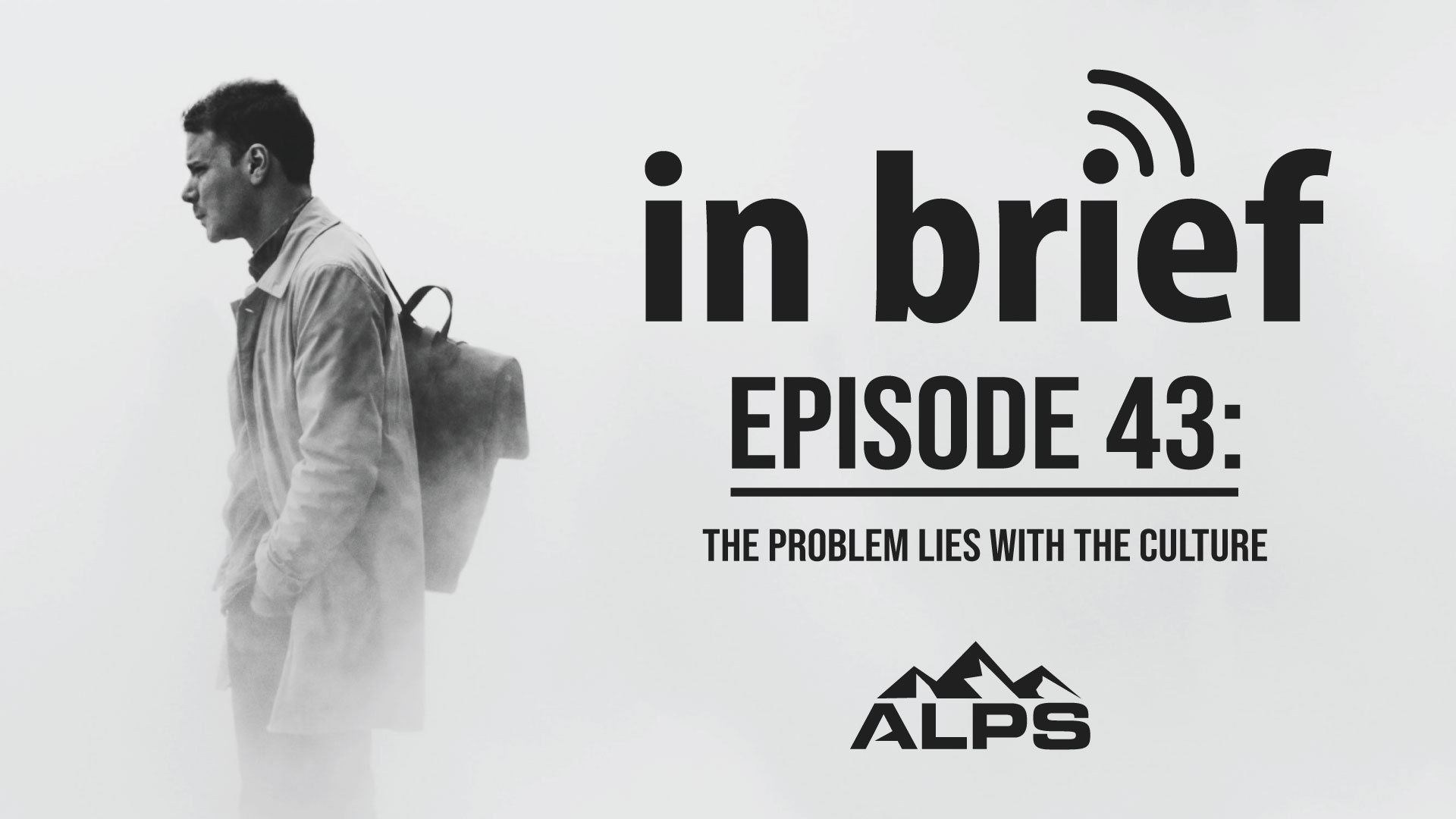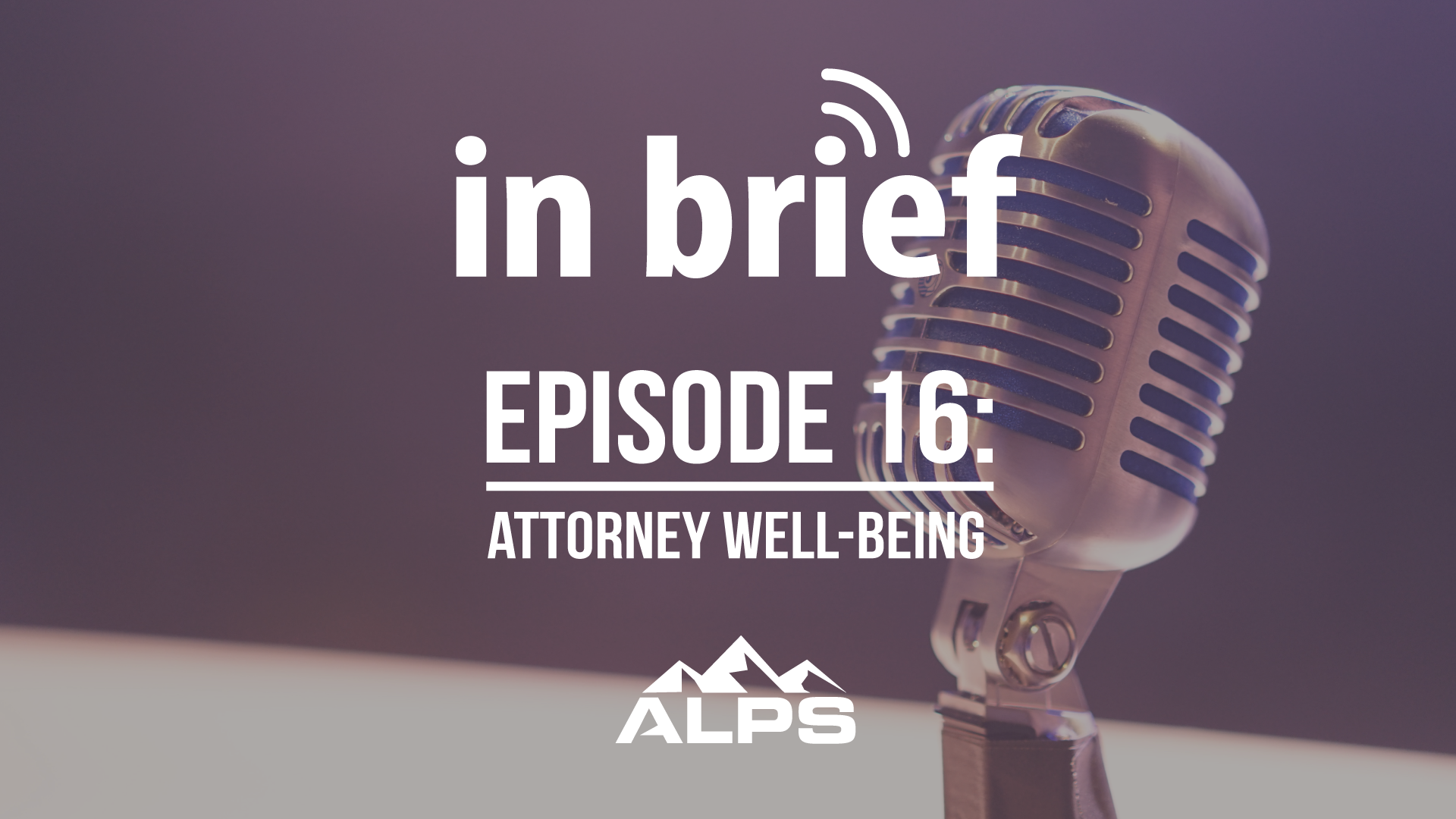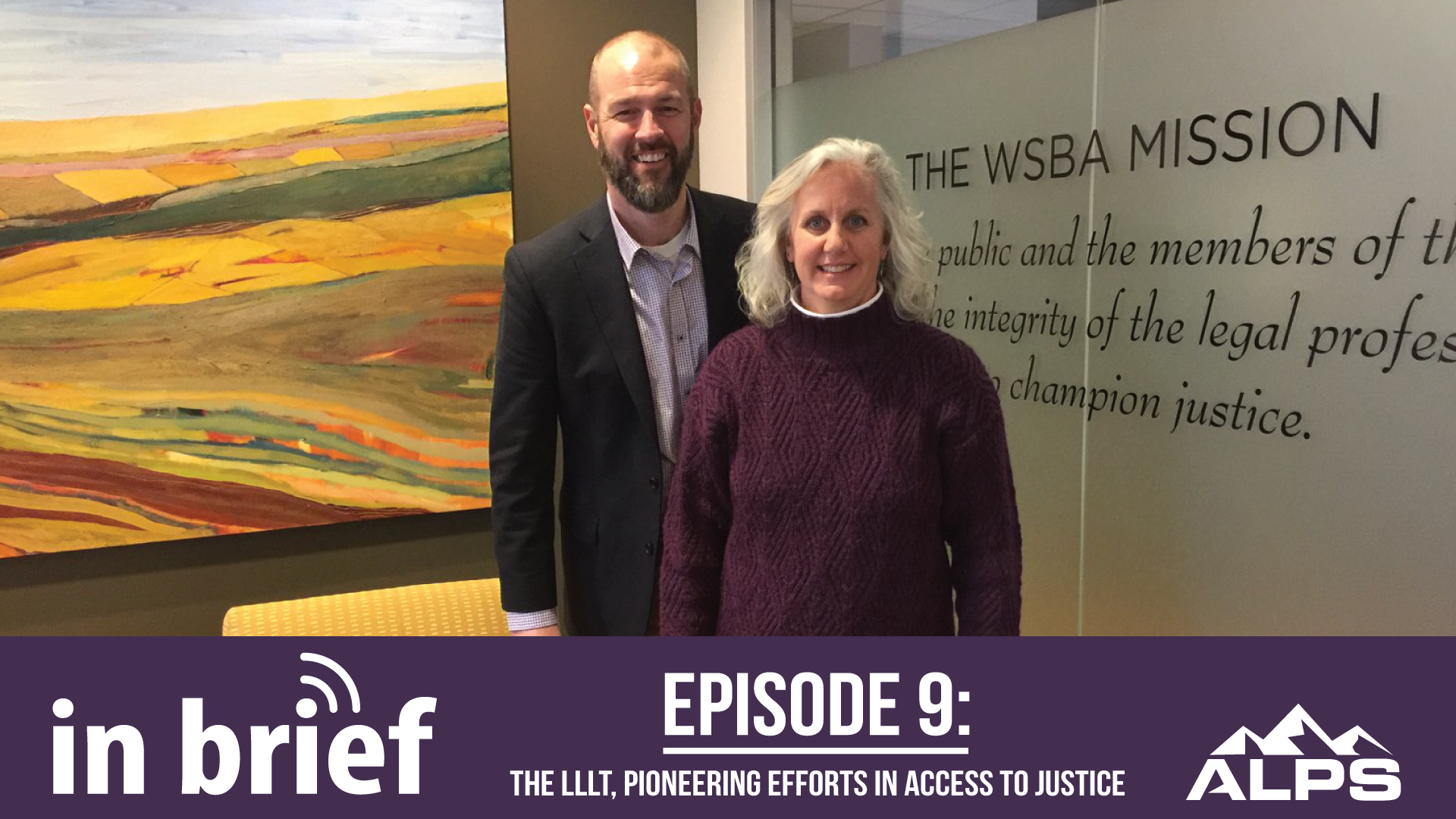10 min read
ALPS In Brief Podcast - Episode 16: Attorney Well-Being
Mark Bassingthwaighte sat down with ALPS’ Executive Vice President Chris Newbold earlier this year to discuss the topic of Attorney well-being....
We've crafted solutions tailored to your firm
The world of insurance for law firms can be confusing, and difficult to navigate. We've created this glossary because these common insurance terms should be easy to understand.
7 min read
 Mark Bassingthwaighte, Risk Manager
:
Updated on February 29, 2024 | Posted on February 27, 2020
Mark Bassingthwaighte, Risk Manager
:
Updated on February 29, 2024 | Posted on February 27, 2020

ALPS Risk Manager Mark Bassingthwaighte shares two real-world stories of attorneys struggling with behaviors that often lead to malpractice claims. As a legal community, it is our duty to lift each other up and to provide hope and support to one another. It is time for us to concede that addiction, depression, and burnout are symptoms of a problematic legal culture, not a “problem lawyer.”
Transcript:
Mark Bassingthwaigthe:
Welcome. You’re listening to ALPS In Brief, the podcast that comes to you from the historic Florence building in beautiful downtown Missoula, Montana. I’m Mark Bassingthwaighte. I’m the Risk Manager here at ALPS and today I’m going to return to the storytelling format. I have two stories that I’d like to share that I think have some real value, hopefully, to at least some of you. A number of years ago I received a phone call from a solo attorney and it was a very interesting conversation. You could tell at the outset that the attorney was, for lack of a better word, troubled. And in short, he was calling to let me know that he was about to commit malpractice and that kind of struck me as odd a little bit. In a way, the malpractice hasn’t happened yet. You’re telling me you… and you just kind of listen.
And what I learned was that he had reached a point in his career where he simply could not do anything else. He could make no more decisions, just nothing left. And he had a statute of limitations date that it was about to run and was calling to let me know that he was going to walk out of his office and quit and never return and just was giving us a heads up. Now thankfully we were able to… We can’t send somebody out and take care of this, but we were able to work with a local bar and have that matter addressed. But this gentleman actually did shortly after hanging up the phone with me, walk out of the office, never returned. He was done. And I can share, I’ve heard that story or situations like this I should say, more than one or two times in my 22 years here at ALPS. This does happen from time to time.
Now a second story that I would like to share has to do with a small firm. And in this situation we learned through a number of claims and I will fill you in in a moment on that, but what basically happened, one of the lawyers really reached a point similar to the attorney in the first story. He just got to a point where he too could not make any more decisions. Now, he didn’t walk out, he didn’t walk away, but he was unable to practice anymore. He enjoyed coming into the firm every day, was very interactive and polite, enjoyed visiting with staff, having his cup of coffee in the morning and visiting with the attorneys and just his normal self or so it appeared. Unfortunately, as he was bringing in new clients and surprisingly he still was bringing in a few clients, he was hiding files. Some were in the trunk of his car. Some were under the carpet. Some were behind furniture in the office.
He just couldn’t make any more decisions and he didn’t know what else to do. Now in that situation, we did have some claims arise out of that and actually the number of claims went into the double digits as a result of this. It’s a small… My memory is, I think, a four or five lawyer firm. Why do I want to talk about these stories or share these stories? Wellness is as I’m sure most, if not all of you, are well aware, is a significant topic in the bar today. There’s an emphasis on wellbeing and I fully support it, but I want to share how failing to address the health issues that can arise can lead to very, very significant outcomes.
And we really do need to take the topic seriously. Now impairments we can broadly define. Today I’m kind of focusing a bit here on depression, but there are all kinds of impairments from burnout, stress, over-work, alcoholism, chemical dependency, gambling addictions. I mean, the list goes on. But let me just share a couple of comments based on these two stories and place it in the context of wellness and wellbeing.
In the first situation, we have a solo attorney here obviously, but I want to underscore if you see someone who is feeling, or I should say demonstrating some signs of depression, reach out to them. And if you are someone dealing with depression, please, please do not just sit and ignore the problem. And I do understand that we don’t want to be labeled as being weak or something like that. I just think that’s not the experience of most people that reach out and try to deal with becoming healthy again and try to work through the problem, deal with depression. But please understand, thinking about the fallout in the second story, depression, we have fatigue, feeling worthless, helpless, all those kinds of things, sort of the normal stuff that people feel. But in some it’s not uncommon.
Depression can lead to impaired concentration. It absolutely can lead to indecisiveness, a loss of interest in pleasure in activities formerly enjoyed, such as practicing law. Insomnia is often there and in all of this, it adds up to poor judgment. Failing to address, even if you’re a solo and isolated from others, can have some significant consequences, not only for you but for your clients. So I encourage you to reach out, find a friend, a loved one, some support system. Heck, if you need to call me and I’m here for you. We need to try to find a way to move forward for your best interest and the interest of your clients.
In terms of the second story, I just want to share another sad reality of what happened here. Fortunately I think it’s not extremely common, but I can say this was not by any means the first time I’ve ever come across a situation like this. I shared that a number of claims came up as a result of the attorney’s depression and the firm’s response was one of, “ALPS, why are you penalizing us? As soon as we found out about the depression, got rid of the problem lawyer and the rest of us did nothing wrong, why are we being punished in terms of the fallout of these claims?” Obviously deductibles are in play, defense, losses, the normal things that happened in malpractice claims were in play here, and that struck me.
I did share in many situations, trying to deal with depression is something that is not shameful. And many times people will step up and are supportive, but occasionally that doesn’t happen and I understand the conundrum there and I don’t have the answer. But I do want to say if any of you are ever find yourselves in a situation where you’re dealing with a staff person or a fellow colleague who is depressed, the choice to say, “It’s not our fault,” is absolutely the wrong choice. I mean, put yourself in the shoes of the individual going through the difficult time.
Is this how you would want to be treated? And please understand when you form a firm, thinking about our ethical rules, 5.1 responsibilities of supervisory lawyers, managing partners, that role we are, it’s what I call the partners keepers rule. We are our partners keepers. We sink or swim together. And honestly that’s the way it should be. So I encourage you, again, impairments are a significant source in terms of the underlying true cause of malpractice claims. They really are. The industry doesn’t track it. We’ll sit here and say, “Okay, we tracked. The date got blown,” whatever it might be. It’s the, “What happened?” We don’t track the why. I’m telling you I’ve been in this business for 22 years. This is one of the major why’s that a significant number of claims happen. So we need to be sensitive.
Our rules do not require us to be physicians and to be able to diagnose depression or to identify someone and say, “You do have a chemical addiction.” That’s not our role. But in the context of depression, what can you look for? What can you think about? How can you catch this early so that you don’t ever find yourselves having to deal with multiple claims because depression went unrecognized, undiagnosed? You cannot bury your head in the sand. So be aware of just some of the warning signs. Depressed individuals often become isolated. They can become sarcastic or withdrawn. There may be sudden changes in behaviors such as absenteeism, loss of interest in family and friends, an increased need for sleep, the onset of insomnia, and sometimes you even see self destructive behavior.
Changes in appearance actually are also quite common. There could be a significant change in weight or a loss of interest in personal appearance and what quite severe. Obviously depression can lead to suicidal thoughts and I will just take one brief aside and say, if someone, again, one of your peers that in a firm or a staff member, if there’s ever an expression of a suicidal thought, please take that very seriously and seek help immediately. Okay. Particularly if there’s any kind of plan expressed or they start to give away possessions. Take that very, very seriously. Get help, help them get help. But at the end, I guess my takeaway is depression really is a significant problem in our profession. I have worked with, talked with, more lawyers struggling with depression than I ever thought I would before I got into this.
It’s not a mark of shame. It’s not something that we should be shamed, shameful in terms of feeling depressed. Just please accept it for what it is. It’s a human being going, struggling with life, going through something difficult and let’s be there. Let’s be the support system to try to help, to have attorney return if that’s what he or she ultimately decides to do to the practice and get back up and go on full steam or perhaps they really have come to the point where they say, “This isn’t for me,” and that’s okay too. So they… We help them exit gracefully and move on to bigger and better things, whatever that might mean for them. I think, in my mind, it’s one of the hallmarks in terms of doing the kinds of things I’m talking about here of just being professional. Let’s rise to the occasion and help our colleagues and help our peers and help ourselves if it’s us that are struggling. There’s no shame here.
So those are my stories. I’m just trying to do whatever I can in whatever small ways I am able to give a little hope and to just give a message. You can get through this and that we are our partners keepers, even if it’s a solo down the street. I mean after all, we have a local community professional. So that’s my two cents for today. Folks, I hope you found something of value out of my brief podcast here and if have any questions, concerns, want to talk about this topic a little bit more in depth or just need a little additional information, please don’t hesitate to reach out. I would be happy to help in any way that I can. You may reach me at mbass@alpsinsurance.com or call our 800 number, 800-367-2577 and ask for Mark, the risk manager. Hey, it’s been a pleasure. So long.
ALPS In Brief Podcast Intro/Outro Music: Walk In The Park by Audionautix is licensed under a Creative Commons Attribution 4.0 license. https://creativecommons.org/licenses/by/4.0/
Artist: http://audionautix.com/
Mark Bassingthwaighte, Esq., serves as Risk Manager at ALPS, a leading provider of insurance and risk management solutions for law firms. Since joining ALPS in 1998, Mark has worked with more than 1200 law firms nationwide, helping attorneys identify vulnerabilities, strengthen firm operations, and reduce professional liability risks. He has presented over 700 continuing legal education (CLE) seminars across the United States and written extensively on the topics of risk management, legal ethics, and cyber security. A trusted voice in the legal community, Mark is a member of the State Bar of Montana and the American Bar Association and holds a J.D. from Drake University Law School. His mission is to help attorneys build safer, more resilient practices in a rapidly evolving legal environment.

10 min read
Mark Bassingthwaighte sat down with ALPS’ Executive Vice President Chris Newbold earlier this year to discuss the topic of Attorney well-being....

18 min read
Professor Heidi K. Brown is a former construction litigator, author and self-described introvert. Mark was able to connect with Heidi, who is based...

11 min read
Recorded from the Washington State Bar Association offices in Seattle, ALPS Executive Vice President, Chris Newbold, sits down with WSBA Executive...